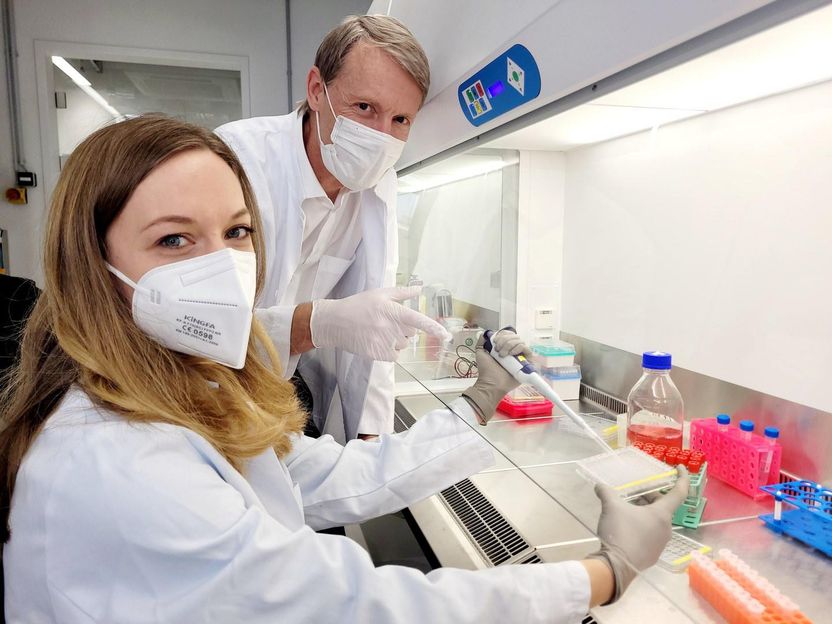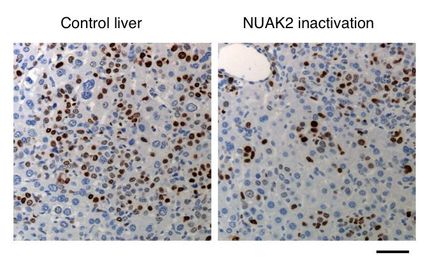Orange lichens are potential source for anticancer drugs
An orange pigment found in lichens and rhubarb called parietin may have potential as an anti-cancer drug, scientists at Winship Cancer Institute of Emory University have discovered.
Parietin, also known as physcion, could slow the growth of and kill human leukemia cells obtained directly from patients, without obvious toxicity to human blood cells, the authors report. The pigment could also inhibit the growth of human cancer cell lines derived from lung and head and neck tumors when grafted into mice.
A team of researchers led by Jing Chen, PhD, discovered the properties of parietin because they were looking for inhibitors for the metabolic enzyme 6PGD (6-phosphogluconate dehydrogenase). 6PGD is part of the pentose phosphate pathway, which supplies cellular building blocks for rapid growth. Researchers have already found 6PGD enzyme activity increased in several types of cancer cells.
"This is part of the Warburg effect, the distortion of cancer cells' metabolism," says Chen, professor of hematology and medical oncology at Emory University School of Medicine and Winship Cancer Institute. "We found that 6PGD is an important metabolic branch point in several types of cancer cells."
This work represents a collaboration among three laboratories at Winship led by Chen, Sumin Kang, PhD, assistant professor of hematology and medical oncology, and Jun Fan, PhD, assistant professor of radiation oncology. Co-first authors are postdoctoral fellows Ruiting Lin, PhD, and Changliang Shan, PhD, and former graduate student Shannon Elf, PhD, now at Harvard.
The Winship team obtained cancer cells from a patient with acute lymphoblastic leukemia, and found doses of physcion/parietin that could kill half the leukemia cells in culture within 48 hours, while the same doses left healthy blood cells unscathed. A more potent derivative of the pigment called S3 could cut the growth of a lung cancer cell line by a factor of three over 11 days, when the cells were implanted into mice.
Although 6PGD inhibitors appear to be nontoxic to healthy cells, more toxicology studies are needed, both to assess potential side effects and to see whether people with inherited conditions would be more sensitive to the drugs. Parietin is present in some natural food pigments, but has not been tested as a drug in humans.
Original publication
Other news from the department science

Get the life science industry in your inbox
By submitting this form you agree that LUMITOS AG will send you the newsletter(s) selected above by email. Your data will not be passed on to third parties. Your data will be stored and processed in accordance with our data protection regulations. LUMITOS may contact you by email for the purpose of advertising or market and opinion surveys. You can revoke your consent at any time without giving reasons to LUMITOS AG, Ernst-Augustin-Str. 2, 12489 Berlin, Germany or by e-mail at revoke@lumitos.com with effect for the future. In addition, each email contains a link to unsubscribe from the corresponding newsletter.
Most read news
More news from our other portals
Last viewed contents
Spectral Genomics Forges License Agreement With Affymetrix
Category:Viperidae
Shire to combine with Baxalta - Combination creates global biotechnology company
OMEICOS Secures Extension of Series B Financing Round
E._Thayer_Gaston
List_of_hummingbirds_in_taxonomic_order
Bismarck_brown_Y
Hypokalemic_periodic_paralysis



















































